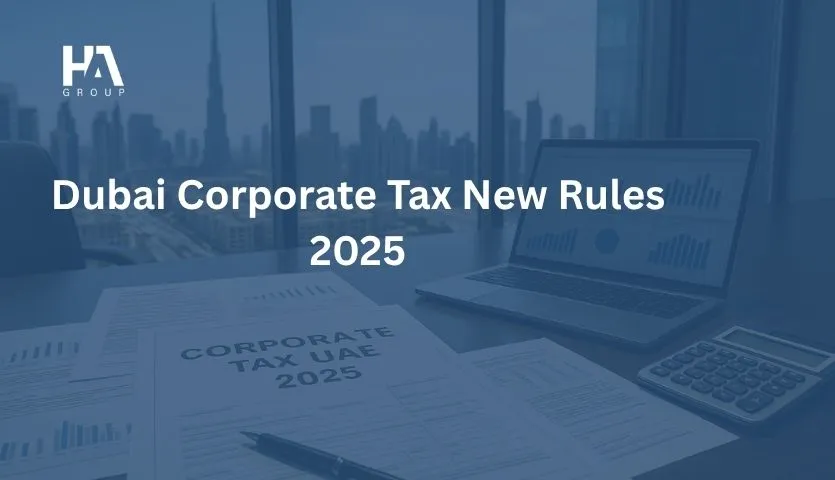In this article, we explore the Dubai corporate tax new rules 2025, focusing particularly on how businesses—especially those opening corporate bank accounts in the UAE—should prepare and comply. As specialists in business setup and banking facilitation at HA Group, we want to help you navigate the evolving tax landscape with clarity, practical advice, and local insight.
Why the new rules matter for your corporate bank account
If you’re opening a corporate bank account in Dubai, the environment around tax and regulatory compliance has changed significantly. Banks now evaluate a company’s structure, financial history, and compliance status before onboarding.

Under the 2025 framework:
- The Federal Corporate Tax Law applies across all Emirates, including Dubai, and is administered by the Federal Tax Authority (FTA). (Official UAE Government Portal – Corporate Tax)
- The introduction of the Domestic Minimum Top-Up Tax (DMTT) from 2025 means companies must maintain updated tax documentation and proof of compliance. (Ministry of Finance – DMTT Announcement, 2024)
- If your entity operates from a free zone or holds a local bank account in Dubai, you must understand whether you still qualify for 0 % or reduced rates—or whether you now fall under the 9 % regime.
Understanding the Dubai corporate tax new rules 2025 is essential not only for tax compliance but also for smooth business banking in the UAE.
What Really Are the Dubai Corporate Tax New Rules 2025?
1. Standard Rate: 9 % Corporate Tax, AED 375,000 Threshold
The UAE’s Federal Decree-Law No. 47 of 2022 on the Taxation of Corporations and Businesses introduced a 9 % corporate tax on business profits starting June 2023. (Ministry of Finance – Corporate Tax Overview)
Key details:
- 0 % on taxable profits up to AED 375,000
- 9 % on taxable profits above AED 375,000
- Applies across all Emirates unless specific exemptions apply
The threshold of AED 375,000 was set to support SMEs and maintain the UAE’s competitiveness as a global investment destination.
2. The 2025 Update: Domestic Minimum Top-Up Tax (15 %)
Effective 1 January 2025, the UAE is implementing a Domestic Minimum Top-Up Tax (DMTT) aligned with the OECD’s Global Minimum Tax (Pillar Two). (The National News – UAE to introduce 15 percent minimum tax in 2025)
Who is affected:
- Multinational Enterprises (MNEs) with global consolidated revenues of at least €750 million (≈ AED 2.99 billion) in two of the previous four years.
- UAE-based subsidiaries of such groups must ensure their effective tax rate is ≥ 15 %; otherwise, they will pay the difference through DMTT.
This ensures that large international groups operating in the UAE meet the OECD’s global minimum standards, while local SMEs remain at 9 % or below.
3. Compliance Deadlines and Registration Rules
All taxable persons must register with the Federal Tax Authority for corporate tax. (FTA – Corporate Tax Guides & Registration)
Key Deadlines:
- Companies with a financial year ending 31 December 2024 must file their first corporate tax return by 30 September 2025 (i.e., nine months after year-end).
- Late filing or non-registration may result in administrative penalties as outlined in FTA Decision No. 10 of 2023.
Proper registration and timely filing are now part of every business’s banking compliance checklist in Dubai.
4. Free-Zone vs Mainland Companies — Key Changes for 2025
Free-zone companies can still enjoy 0 % tax on “qualifying income” if they meet the conditions of a Qualifying Free Zone Person (QFZP) as per Cabinet Decision No. 55 of 2023 and Ministerial Decision No. 265 of 2023. (Khaleej Times – Free Zones Retain 0 Percent Tax on Qualifying Income)
Conditions include:
- Maintaining adequate substance in the UAE
- Earning income from qualifying activities (e.g., manufacturing, distribution outside the UAE, or holding company functions)
- Complying with transfer pricing and economic substance regulations
Free-zone entities that earn mainland revenue or fail the QFZP criteria will fall under the 9 % corporate tax rate.
5. Impact on Corporate Bank Accounts in Dubai
With the new tax rules, banks in Dubai have tightened their Know Your Customer (KYC) and compliance requirements. Expect the following when opening a corporate bank account:
- FTA Registration Number: Banks will request your Corporate Tax Registration Certificate or Tax Registration Number (TRN).
- Financial Statements: Recent audited accounts or management financials demonstrating profitability and tax calculations.
- Substance and Business Activity Proof: For free-zone companies, documentation showing where income is earned and how it qualifies for 0 % tax.
- Group Disclosure: If your entity is part of a multinational group, you may need to declare group structure and confirm DMTT compliance.
These requirements align with the UAE Central Bank’s anti-money-laundering and tax transparency standards.
Practical Steps for Businesses Opening a Dubai Corporate Bank Account

- Verify your entity status – Mainland or free-zone, and which fiscal year applies.
- Register with FTA early – Apply for Corporate Tax Registration on the FTA portal before opening bank accounts.
- Prepare audited financials – Banks now expect transparent accounting records showing tax compliance.
- Check free-zone eligibility – Confirm you qualify as a QFZP under Cabinet Decision No. 55 of 2023.
- Assess DMTT risk – If your group has global revenue ≥ €750 million, review the 15 % top-up requirement.
- Align documentation – Ensure your trade license, tax records, and bank application data match.
- Stay updated on filing deadlines – Keep reminders for FTA returns to avoid penalties and banking issues.
Frequently Asked Questions (FAQ)
Q: What is the corporate tax rate under the Dubai corporate tax new rules 2025?
A: Profits up to AED 375,000 are taxed at 0 %; profits above that are taxed at 9 %. Large multinationals may face a 15 % minimum tax under DMTT.
Q: Does the rule apply to free-zone companies?
A: Yes. Free-zone companies can still benefit from 0 % tax on qualifying income if they meet QFZP criteria. Otherwise, the 9 % rate applies.
Q: When is the first corporate tax return due?
A: For financial years ending 31 December 2024, returns must be filed by 30 September 2025.
Q: How does this affect bank account opening?
A: Banks now require proof of tax registration and compliance before approving corporate accounts. Free-zone entities will be scrutinised for their qualifying income status.
Q: Are small businesses exempt?
A: SMEs earning up to AED 375,000 profit pay 0 % tax but must still register and file returns with the FTA.
How HA Group Can Help You Comply in 2025
At HA Group, we specialise in helping entrepreneurs and companies navigate the complex intersection of tax compliance and corporate banking in Dubai. Our services include:
- Structuring companies (mainland or free-zone) for optimal tax and bank readiness
- Preparing corporate bank account applications with tax compliance documentation
- Guiding you through FTA registration and audit preparation
- Coordinating with local banks to meet updated AML and KYC requirements
If you plan to open a corporate bank account in Dubai and want to ensure full compliance with the Dubai corporate tax new rules 2025, contact HA Group today for a tailored consultation.
Final Words
The Dubai corporate tax new rules 2025 signal more than just another policy update — they mark the UAE’s evolution into a globally aligned, transparent, and mature business hub. The message is clear: the era of informal tax practices is fading, replaced by precision, documentation, and trust.
For entrepreneurs and companies opening corporate bank accounts in Dubai, the shift is both a challenge and an opportunity. Banks now look for proof of structure, not just promise; for clarity, not complexity. And while the paperwork may feel heavier, the reward is long-term stability in one of the world’s most pro-business financial ecosystems.
So, what should you do? Stay one step ahead. Register early with the Federal Tax Authority, file your returns before deadlines sneak up, and keep your books as clean as your balance sheet dreams. In a landscape where compliance equals credibility, small proactive steps can save you from big future headaches.
Dubai remains what it has always been — ambitious, forward-thinking, and open to those who play by the rules. And at HA Group, we’re here to help you do exactly that — from structuring your company to opening a compliant, fully functional corporate bank account.
Ready to align your business with the new era of tax transparency?
Reach out to HA Group today for tailored guidance and a seamless banking setup experience.
Disclaimer: The information provided in this article is for general guidance only and should not be interpreted as legal or tax advice. Always consult a qualified tax professional or legal advisor before making business decisions.
Recommended Articles:
Can a Tourist Open a Bank Account in Dubai?
Common Challenges in Opening Business Bank Accounts in UAE
Documents Required to Open a Business Account in Dubai – 2025 Guide
How Long Does It Take to Open a Business Bank Account in Dubai in 2025?
What Is the Process of Bank Account Opening for New Companies in UAE







